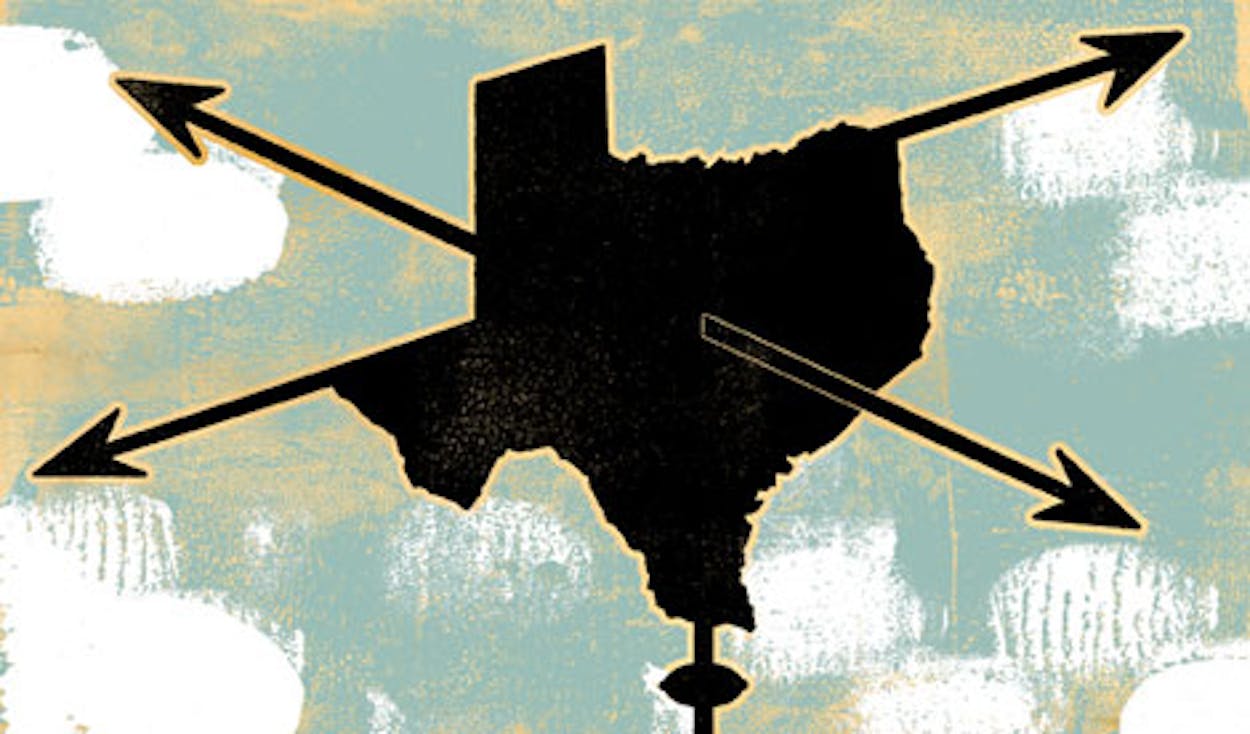How is the presidential race going to affect Texas?
It’s easier to say how it won’t. The Republican ticket will not be topped by a popular George W. Bush, as it was in 1994 and 1998 (when he ran for governor) and 2000 and 2004 (when he ran for president). Bush was a Democrat killer. When he headed off to Washington, D.C., Republicans held every statewide office and every seat on the Supreme Court and the Court of Criminal Appeals. No matter who leads the ticket this time—and the recent Texas Lyceum poll showed John McCain in the lead, at 27 percent, followed by Rudy Guiliani (23 percent), Fred Thompson (11 percent), and Mitt Romney and Newt Gingrich (6 percent)—the GOP nominee is unlikely to have long coattails here. On the Democratic side, Hillary Clinton led the Lyceum poll with 33 percent, trailed by Barack Obama (21 percent), Al Gore (10 percent), and John Edwards (8 percent). Republicans are rooting for Clinton to prevail, believing that she will motivate their somewhat dispirited troops to vote, producing a Republican sweep. But she’ll motivate D’s too.
There’s speculation that John Cornyn might be vulnerable to a Democratic challenger.
The latest SurveyUSA poll shows our junior U.S. senator in negative territory, with a 42 percent favorable rating and a 43 percent unfavorable rating—a poor showing. The problem for Democrats is that the Republican domination of state politics has begun to erode before the D’s have positioned themselves to capitalize on Cornyn’s weakness. They don’t have a strong party structure, they don’t have a broad fund-raising base, and they don’t have a bench. They do have one announced candidate, Mikal Watts, a San Antonio trial lawyer who has set aside $3.8 million for the race, equaling Cornyn’s war chest, and another exploring his options, Houston state representative Rick Noriega. Watts has some flies on him, as political consultants are wont to say: He has contributed to Republicans, and he is pro-life. Noriega will not be able to approach Watts’s war chest, but recent elections have proved that a Hispanic surname is a priceless asset in a Democratic primary. Cornyn would start the race as a 55—45 favorite, but his record of supporting Bush’s war policy will be an issue, as will immigration. Cornyn’s outspoken opposition to amnesty could cut either way.
Is that the only high-profile race?
Two congressional seats that changed hands in 2006 will get a lot of national attention. One is the Twenty-second District, where Democrat Nick Lampson will try to hold on to Tom DeLay’s former stomping ground. The Republicans projected as Lampson’s strongest challengers—Sugar Land mayor David Wallace and Harris County tax assessor Paul Bettencourt—have already said they won’t run. The other is the Twenty-third, which stretches from San Antonio to El Paso. Democrat Ciro Rodriguez scored a huge upset there against GOP incumbent Henry Bonilla. Republicans will make a major effort to regain this seat—at least one would-be challenger, lawyer Francisco “Quico” Canseco, has already announced—but Bonilla himself won’t be making a comeback. He’s a consultant to a Washington lobbying firm after a failed attempt to get confirmed as an ambassador to the Organization of American States.
What about the Legislature?
Now, that’s where the action is. Senate district boundaries make most Republican incumbents impregnable, although Mike Jackson, of League City, faces a challenge from Galveston City Council member Joe Jaworski, a grandson of Watergate prosecutor Leon Jaworksi. The spotlight is on the House, where Democrats picked up six seats in ’06, cutting the Republican majority to 81—69. Two elections will be going on at once: the partisan race for control of the House and the race for Speaker. The main battleground in the Speaker’s race will be the March primaries. Twelve to fifteen Democrats support Tom Craddick and receive plum committee assignments in return. At least twenty Republicans, including some respected senior members, have broken openly with him. Both sides will try to purge the defectors in the primaries. It will be all-out war, a bloodbath, and some candidates could spend as much as $1 million—a previously unimaginable sum for a House race. Republicans will try to win back the seats they lost in 2006, with the prime targets being Juan Garcia, in Corpus Christi; Valinda Bolton, in Austin; Paula High-tower Pierson, in Arlington; Allen Vaught, in Dallas; Ellen Cohen, in Houston; and Joe Heflin, in Crosbyton. The at-risk Republicans—the ones who won by the narrowest margins in 2006—are Mike Krusee, in Round Rock; Tony Goolsby, in Dallas; Kirk England, in Grand Prairie; and Bill Zedler, in Arlington. R’s and D’s alike will have to defend at least a dozen other seats.
Is anything going on under the radar?
Democrats are hoping to pull off in Harris County in 2008 what their counterparts in Dallas County achieved in 2006: a courthouse sweep. Yes, courthouses still matter. Every county official—county judge, tax assessor, sheriff, county clerk, district clerk, district judge, county court judge—has a grassroots organization. “Grassroots” means “votes for the entire ticket.” If the D’s win the courthouse, they could pick up some Harris County legislative seats as a bonus.
So this is the big election for the future of Texas politics, right?
Wrong. This is the big election for the future of Tom Craddick. The future of Texas politics will have to wait until 2010, when all the statewide offices will be up for grabs, just about everyone will be running for higher office, and Democrats will be trying to establish that Texas is a two-party state again.
- More About:
- Politics & Policy








